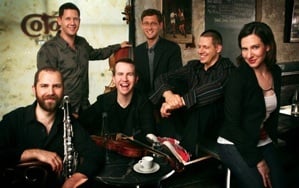The slide is blurry, the image it depicts indistinct. As the viewer squints, trying to make it out, the picture gradually becomes clearer, until she finally recognizes the object portrayed in the projection. Or does she? Is it the face of someone she knows, as she guessed earlier? Or is it someone else — or even a face at all?

Featured Video
Buy Tickets
Slide: Steve Mackey, Rinde Eckert and eighth blackbird
Venue: Dinkelspiel Auditorium, Stanford UniversityCity: Palo Alto
Date: March 5, 2011 8:00pm
Price Range: $44-50
Related Article
Offbeat, Contemporary Groove: Cabrillo Festival’s Good Vibe
July 19, 2010
The event just described was an actual psychological experiment designed to measure the effect of our preconceptions on our perceptions. When the viewer first guessed what the object might be, she took longer to figure out what it really was. And when another person — a shill surreptitiously assigned by the experimenters to disagree with the first viewer’s guess of what image she was looking at — viewed the slides alongside her, and disagreed with her assessment, it took her even longer to figure out what the image signified.
When the charismatic stage performer and director Rinde Eckert learned about this experiment, it struck him as a metaphor for contemporary life, in which our perceptions are distorted and manipulated by our expectations, which might be set by advertisers, propaganda outfits (like Fox “News”), political leaders, even our own psychology and culture. Eckert decided to use the experiment as the basis for one of his unclassifiable stage productions, creating the character of Renard, the scientist who conducted the experiment, now looking back on his work while the audience learns, from flashbacks to his own personal life, that he’s not immune from the self-deception his experiment documents. And like the images in the experiment it dramatizes, Slide itself keeps evolving.
Slide is the latest in a series of opera, oratorio, and experimental theater projects that librettist Eckert has created with composer Steven Mackey. A charismatic singer-performer and Pulitzer Prize finalist in drama who’s earned international acclaim for his visionary solo and collaborative productions (including the searing Slow Fire with Bay Area composer Paul Dresher), the New York–based Eckert has written and directed theater works, composed music for dance, and, in May, will debut, also at Stanford, the Gurs Zyklus, a new music/performance/multimedia installation and collaboration with Seattle-based sound sculptor Trimpin.
Cutting Through the Noise
Mackey grew up in Northern California, playing electric guitar in rock bands, before joining the Princeton University faculty in 1985. His works have been performed by many major orchestras, including the San Francisco Symphony and Los Angeles Philharmonic; chamber ensembles such as the Kronos Quartet; and celebrated soloists. For the 80-minute, 11-song cycle Slide, Mackey employed musical styles ranging from potent contemporary classical to prog-rock.
To perform it, the co-creators enlisted one of America’s more virtuosic and adventurous new music ensembles, eighth blackbird (consisting of flutist Tim Munro, pianist Lisa Kaplan, clarinetist Michael Maccaferri, violinist/violist Matt Albert, cellist and electric bassist Nicholas Photinos, and percussionist Matthew Duvall). The Grammy Award–winning, Chicago-based sextet has won renown for sparking the creation of new works by some of today’s leading composers, including Steve Reich and Jennifer Higdon, and for memorizing the new music they play, the better to breach the boundary between stage and audience.
In Slide, the group members also engage in choreographed movements — conveniently, Renard remembers (or imagines), that he performs in a chamber ensemble — while Mackey plays electric guitar and occasionally narrates. Video projections and some minimal props further enrich the multimedia experience, which Eckert, who plays Renard, calls “a kaleidoscopic marriage of movement, image, text, and music.”
Co-commissioned by Stanford Lively Arts and Southern California’s Ojai festival, Eckert and Mackey’s ambitious production has been revised and performed several times since its 2009 premiere at Ojai, which seemed unfinished and difficult to dramatize, given that the “action” all takes place retrospectively and inside the mind of its protagonist.
“Despite some brilliant music, lovely shadowy imagery, potent monologues and Eckert’s typically riveting physical performance style, the story in his — and Renard’s — head never quite finds its way from there across the stage to the audience,” I wrote in Musical America then. “It feels like a work in progress.” Nevertheless, so many fascinating things happened onstage that I was eager to experience Slide’s many virtues again, after the creators had a chance to refine their variegated creation. Like the images in Renard’s experiment, Slide the production has gradually come into sharper focus, as its creators trimmed songs and narration, revised the video elements, and, through several subsequent productions, tightened and intensified their performances.
Sharpening the Details
The extended gestation has also given the creators time to reflect on what they’ve wrought. “What we’re proudest of is the kick-assedness of the arc of the music — the range of musical energies, going from intimate sweet things where Rinde sings in this angelic falsetto and then this hard-driving electric guitar,” Mackey says. They also understand the story better. Like the title, which has multiple implications (the images Renard projects, the slide guitar Mackey employs, the concept of sliding, refusal to stay in place, like the meaning in those blurry images), the story itself operates on several levels, some not apparent even to its creators until now.
“It’s really about loneliness,” Mackey explains, “and the reflex a lot of us have in which we would rather be right and withhold love than admit we’re wrong and give it freely.” Like the morphing slides of the title, even its creators' interpretation of this metamorphic music-theater work has evolved and clarified since its debut. If Slide's meaning never quite resolves, maybe that’s what the story’s all about.

